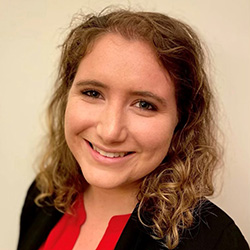How Northwestern Graduate Naomi Lisse is Helping Moderna Produce COVID-19 Vaccines
Lisse (’15) is still benefiting from her time at Northwestern while working for the pharmaceutical giant
Naomi Lisse (’15) was hired by Moderna in August 2020 as a process development engineer.
For obvious reasons, it was quite the time to join the pharmaceutical giant.
“I am very conscious of the fact that this is the most impactful thing I will ever work on in my career,” Lisse said. “There's a sadness to that because the pandemic is impacting so many people across the world in such a negative way. But at the same time, it's certainly invigorating to know that you can have such an impact on the world as part of this team, and I have really enjoyed my experience here at Moderna.”

Based in Boston, Lisse’s group is part of technical development at Moderna. Lisse and her colleagues help define the manufacturing processes that go into therapeutics items like the COVID-19 vaccine, which is crucial to help get the inoculations into people’s arms across the globe. More specifically, Lisse is in the nucleic acid process development group, involving the DNA and RNA sections of the treatment.
The manufacturing process begins with plasmid DNA, and from there the mRNA (the drug’s substance) is produced, before the final formulation that ends up as the treatment. Lisse’s team works at the beginning of the chain that produces the plasmid DNA, figuring out how to produce a vaccine that’s tailor-made for the coronavirus, as the sequence of nucleic acids differs from vaccines such as one for the flu.
“You want to make it as robust for everything as you can,” Lisse said. “You want to make it high-yielding. It's a very different approach, but it's quite cool because when you work on one vaccine you also work on everything.”
Lisse’s career is off to a flying start, and one reason is the faculty she learned from at Northwestern Engineering. Interested in the intersection of biology and chemical engineering, Lisse minored in biotechnology and spent two years in the lab of associate professor of chemical and biological engineering Josh Leonard.
“It is really a great foundation for a lot of biological techniques and really connecting textbooks to lab work,” Lisse said. “What I do now is an intersection of lab work, large-scale manufacturing, and basic first-principle science. Being able to get a taste of that by the time I was 20 years old was really helpful.”
Lisse also said an influential course was the chemical and biological engineering reaction course taught by Michael Jewett, Walter P. Murphy Professor of Chemical and Biological Engineering and director of the Center for Synthetic Biology. And though she graduated six years ago, Lisse said she still looks at notes she took during the class.
“There was some quite relevant classwork,” Lisse said. “Overall, Northwestern just has really excellent professors who are so interested in teaching.”
EDITOR’S NOTE: The thoughts and opinions in this article do not represent Moderna.
